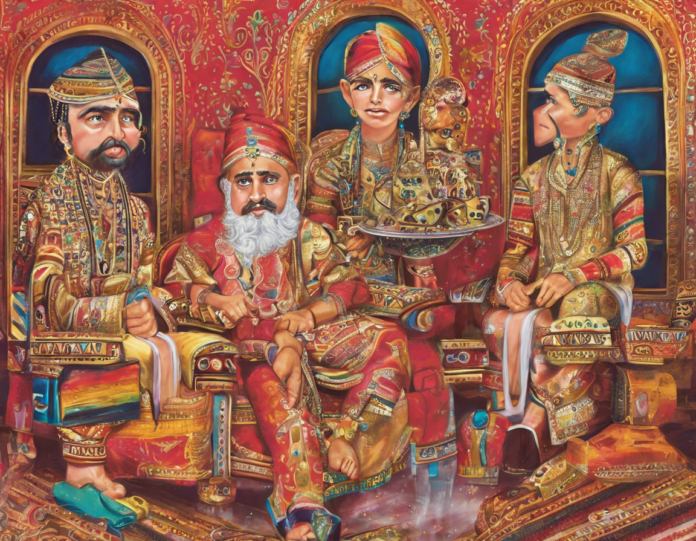The South Asian festival of Karva Chauth, celebrated predominantly by married Hindu women, revolves around fasting for the long life of their spouses. This day, which falls on the fourth day after the full moon in the month of Kartika, is observed by waking up before dawn to consume a meal known as Sargi. Sargi is a pre-dawn meal that married women eat before starting their day-long fast.
Understanding Sargi Time
What is Sargi?
Sargi is a traditional meal comprising a variety of foods that mother-in-laws prepare for their daughters-in-law to consume before sunrise on the day of Karva Chauth. It typically includes fenia (a sweet vermicelli dish), fruits, nuts, sewaiyan, coconut, and more.
Significance of Sargi:
The Sargi meal holds immense importance as it provides sustenance and energy to women who are about to observe a day-long fast without consuming any food or water until the moonrise.
The Ritual of Sargi:
Time of Consumption:
Sargi is consumed before sunrise, often around 4:00 – 4:30 AM, to ensure that the stomach remains full throughout the day.
Importance of Pre-Dawn Meal:
Consuming Sargi is believed to provide strength and stamina to women, enabling them to sustain themselves through the day without feeling exhausted or fatigued.
Traditional Foods in Sargi:
Nutrient-rich Items:
Sargi typically includes foods that are high in nutrients, providing a good mix of carbohydrates, proteins, and healthy fats, ensuring that the fasting individuals remain energized throughout the day.
Balanced Diet:
The meal also emphasizes the importance of a balanced diet, incorporating fruits, nuts, and dairy products, which are beneficial for maintaining overall health during the fasting period.
Benefits of Embracing Sargi Time:
Physical Strength:
Consuming Sargi before the fast begins helps in maintaining physical strength and stamina, ensuring that individuals can perform their daily tasks without feeling weak.
Mental Resilience:
The Sargi meal can also contribute to mental resilience by providing a sense of satisfaction and nourishment, helping individuals remain focused and determined throughout the day.
Tips for a Healthy Sargi Meal:
Stay Hydrated:
Incorporate hydrating foods such as cucumbers and watermelons in the Sargi meal to keep the body well-hydrated during the fast.
Include Protein:
Adding protein-rich items like paneer or nuts can help in maintaining muscle mass and keeping individuals fuller for a longer duration.
Fiber Intake:
Including fiber-rich foods like fruits and vegetables can aid in digestion and prevent constipation during the fasting period.
Celebrating Sargi Time in Modern Times:
In contemporary settings, the tradition of Sargi has evolved, with women embracing healthier food options while still adhering to the essence of the ritual. From smoothies and overnight oats to quinoa salads and chia seed puddings, modern Sargi meals blend traditional values with modern dietary preferences.
FAQs about Sargi Time:
1. Is Sargi only consumed during Karva Chauth?
While Sargi is traditionally associated with Karva Chauth, some families also observe this pre-dawn meal ritual during other significant occasions or festivals.
2. Can men also consume Sargi?
Though Sargi is primarily prepared for married women observing fasts, men can also partake in the pre-dawn meal to show solidarity and support.
3. What should I do if I am unable to wake up early for Sargi?
If waking up before sunrise is challenging, you can opt for a light meal or smoothie before starting your fast for the day.
4. Can Sargi be customized based on dietary preferences?
Yes, individuals can customize their Sargi meals based on their dietary preferences, incorporating foods that align with their nutritional needs.
5. What are some traditional variations of Sargi in different regions of South Asia?
Different regions in South Asia have their own variations of Sargi dishes, incorporating local delicacies and flavors to make the meal more region-specific.
Embracing Tradition with a Twist:
While Sargi time is deeply rooted in traditional beliefs and customs, modern interpretations of this ritual emphasize the importance of healthy eating and balanced nutrition to support individuals through a day of fasting. By blending traditional values with contemporary dietary choices, individuals can uphold the significance of Sargi time while prioritizing their health and well-being in today’s fast-paced world.




